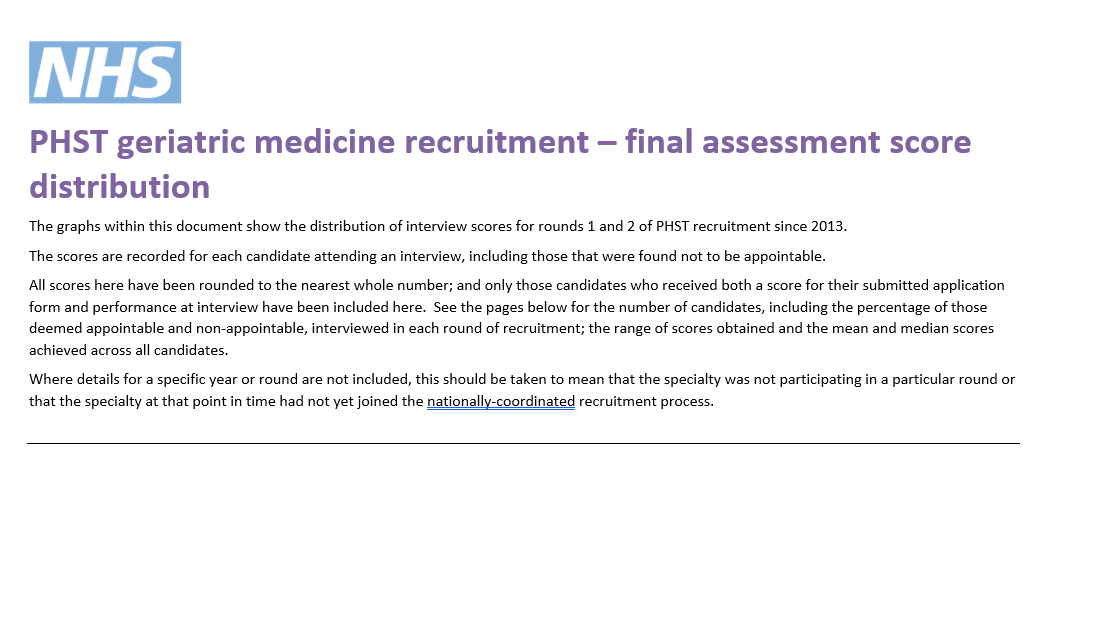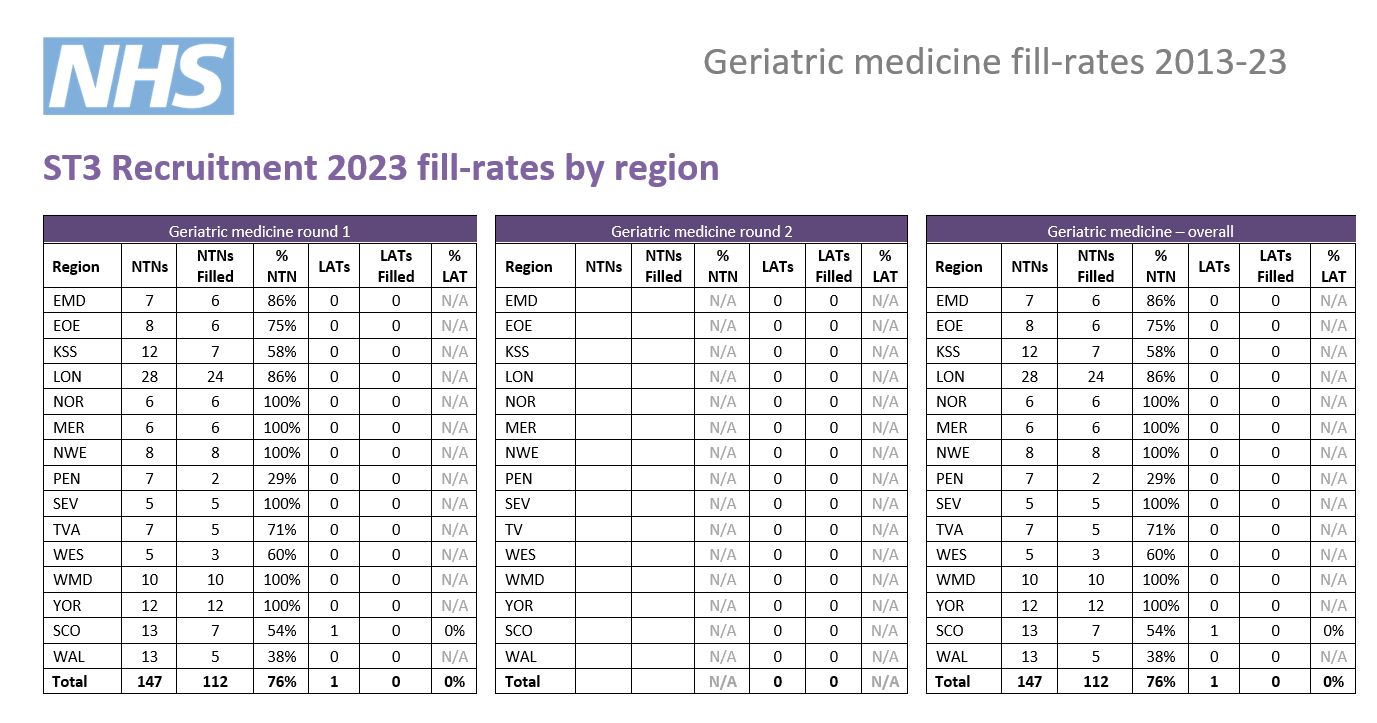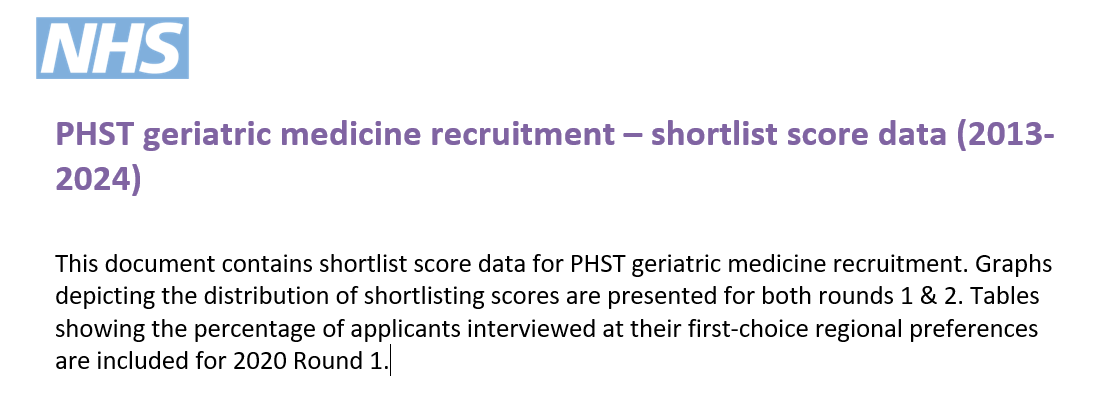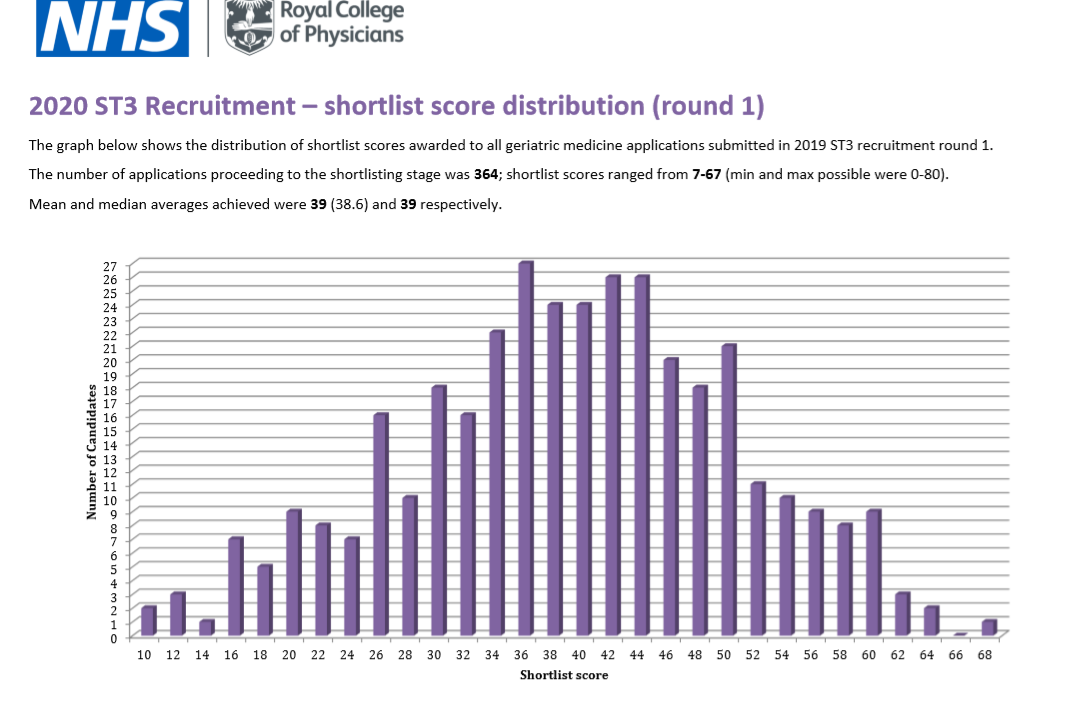Geriatric medicine (often referred to as 'care of the elderly') is the largest specialty in the UK in terms of consultant numbers.
With society's demographic change and more people living to an old age, the specialty continues to gain both importance and prominence.
Geriatric medicine - trainee characteristrics
It is important that any doctor considering geriatric medicine as a career should:
-
have an interest in and aptitude for dealing with older people
-
have a caring and empathic nature
-
enjoy working in multi-disciplinary teams
-
be able to communicate easily with colleagues, other health professionals, patients and carers
-
be enthusiastic and have leadership potential
-
enjoy complex decision-making and prioritising medical problems
-
have an interest in ethical issues.
Working/training in a HST geriatric medicine post
Geriatric medicine is an extremely enjoyable and challenging field to work in, no two days are the same!
It offers the individual an opportunity to specialise not only in the care of older people, but also to sub-specialise and develop an interest in related problems such as stroke, falls, dementia, continence, and movement disorders.
Doctors can work in different clinical settings including acute care, rehabilitation wards and the community.
Dual training
All training programmes in geriatric medicine will be 'dual accredited with general (internal) medicine (GIM), which takes four years to complete (or pro-rata if training less-than-full-time).
Dual training ensures that specialists of the future have the necessary skills to deal with all the problems which may occur in old age.
If trainees wish to pursue specialist stroke medicine training as well, this requires an additional year of training (extending training to a total of six years).
Further information
- NHS health careers
- JRCPTB specialty page and curriculum
- ST4 geriatric medicine person specification
- British Geriatrics Society
General / application queries
For general queries relating to areas such as eligibility criteria, making an application or the Oriel system, please contact the Physician Specialty Recruitment Office.
Queries regarding the progress of a submitted application should be directed to the lead recruiter for this specialty. The lead recruiter for geriatric medicine in is North West.
| North West | |
|---|---|
| Postal address |
3rd Floor 3 Picadilly Place Manchester M1 3BN |
| Email address | [email protected] |
| Website | http://www.nwpgmd.nhs.uk/ |
Group 1 specialty
This is a Group 1 specialty and requires completion of the internal medicine training (IMT) stage 1 programme or equivalent; all programmes in the specialty will dual specialise with general internal medicine.
Therefore, this specialty uses the standard HST eligibility criteria for Group 1 specialties and does not accept candidates from any alternative training routes. Please visit the am I eligible? section of this website for further information.
Commitment to specialty
The specialty will not be assessing your commitment to specialty as part of the shortlisting process and will score your application purely via the self-assessment scoring framework. Commitment to specialty will be assessed as part of the interview.
Indicative post numbers
Indicative vacancy numbers are available in the table below, broken down by region and divided between substantive national training number (NTN) and locum appointment for training (LAT) posts. In many cases these will be presented as a range (e.g. 1-4) as it is not always possible for regions to know at this stage how many vacancies there will be.
It is the intention that indicative post numbers for all regions will be published prior to the application opening date, although this cannot be guaranteed. Please note that this table is not likely to be updated subsequent to indicative numbers and actual numbers will be confirmed when programme preferences are opened later in the round.
Numbers subject to change
Please be aware that it is not uncommon for vacancy numbers to change as the round progresses.
More commonly, post vacancy numbers can increase as the round goes on (and confirmation of posts becomes available); but it is also possible that numbers can reduce as well. In the past, post numbers have risen an average of 20-40% from the start to the finish of the round but this can vary greatly for individual specialty/region combinations.
It is possible that regions which do not have a post at the start of the round may declare one after applications have closed. Whilst we try and minimise instances of this, it is not always possible to predict vacancies so even if there appears not to be a vacancy in your preferred specialty/region combination, you may wish to consider applying in case one becomes available during the round; you can check with the region concerned if you wish to check on the likelihood of a post arising.
Generally, once a region enter a post into a round they would always have at least one post available and would only withdraw it in exceptional circumstances.
Round 1 Interview dates & posts
| Region | NTN posts | LAT posts* | Evidence upload date(s) | Interview date(s) |
|---|---|---|---|---|
| East Midlands |
3 - 4 |
N/A |
20/12/23 - 05/01/24 |
14, 15, 20, 21, 22 March 2024 |
| East of England |
6 - 11 |
N/A |
||
|
London |
0 - 15 |
N/A |
||
|
Kent, Surrey and Sussex |
0 - 8 |
N/A |
||
| North East |
TBC |
N/A |
||
| North West |
North West 3 - 4 Mersey 3 - 4 |
N/A |
||
|
South West |
Peninsula 1 - 7 |
N/A |
||
|
Severn N/A |
N/A |
|||
| Thames Valley |
5 - 8 |
N/A |
||
| Wessex |
5 - 11 |
N/A |
||
| West Midlands |
1 - 11 |
N/A |
||
| Yorkshire & Humber |
TBC |
N/A |
||
| Scotland** |
13 - 16 |
TBC |
||
| Wales |
TBC |
TBC |
*English LATs
Please note, English regions do not recruit to LAT posts.
**Scotland post numbers
If you are interested in working in Scotland, a breakdown of post numbers by the four Scottish regions is available on the Scottish Medical Training website. This has details of all specialty training post numbers in Scotland, including specialties which are not part of the nationally-coordinated process.
The SMT website will always be the more accurate one where they differ.
Interview content
The interview be split across two separate stations with a separate pair of interviewers scoring you on the areas within their station. There will be four questions, ranging between 5-10 minutes in length. You will be marked on these questions and your communication skills, giving five scored areas in total. The headings below show the question areas and in which station they will be covered, along with information about what will be assessed.
Each station will last 15 minutes, so, including the time between stations, the interview will be approximately 40 minutes.
Please note that this is subject to change and will be confirmed by the date of interview.
Prior to this question you will be given a clinical scenario and a short while to review it. You will then be asked questions relating to this scenario. This question will last approximately 10 minutes.
The clinical scenario will be relatively brief (two/three sentences), so once you have seen this, the remainder of the preparation time will allow you to undertake some short mental preparation. Whilst it is permitted to make notes, these must be destroyed as soon as your interview is completed and not shared with anyone.
Clinical scenario considerations
The scenario will describe a hypothetical clinical situation which has arisen in which you are, or have become, involved. Some points to consider when reviewing the scenario and preparing for discussion are:
- what steps you would take
- any potential treatments possible
- any further information you would gather
- how you would go about communicating with any people (eg patients, family members, colleagues) involved in the scenario
You should also consider any other factors you deem appropriate, using your experience and professional judgement.
Areas for assessment
One mark will be awarded to you based on your suggestions and responses to the clinical scenario. The second mark will be on the communication skills you display.
This will be both an assessment of how you would communicate with patients, colleagues, etc. in the scenario, as well as of how well you communicate with interviewers.
This question will focus on your suitability for and commitment to higher training in the specialty and give you opportunity to expand on the information provided in your application form.
This question will last approximately 5 minutes.
This question will see you given an ethical scenario to review. As with the clinical scenario, this ethical scenario takes the form of a hypothetical situation, described briefly in text form, details of which will be given to you before discussion. You will have a short while to review the scenario and there will be approximately 7 minutes of discussion afterwards.
This scenario focuses less on a clinical situation, and deals more with consideration of the moral, ethical, legal (etc.) issues which may arise in a situation.
The area of assessment here will be your suggested responses to the ethical scenario during discussion, as well as your knowledge of the different considerations required.
This question will explore the non-clinical aspects of being a medical registrar, focusing on two of the Capabilities in Practice (CiPs) from the Internal Medicine Stage 1 Curriculum:
- Managing an acute unselected take
- Managing a multi-disciplinary team including effective discharge planning
This discussion will be prompted by a short question provided by interviewers. This will not be given to you before - this will be given verbally by interviewers once the previous question is finished. This question will last approximately 8 minutes.
Questioning will ask you to draw on your experience of managing a team caring for acute medical admissions by giving examples of how you have managed that type of situation.
Scoring framework
The score of 1-5 an interviewer will award you for each assessment area is judged in relation to how well you perform against an expected level. Below is the framework used to award scores at interview, as well as interpretation of what these scores represent:
|
Mark
|
Rating
|
Assessment
|
|
1 |
poor |
not considered appointable |
|
2 |
area for concern |
performed below the level expected from a core level trainee applying to the specialty; |
|
3 |
satisfactory |
performed at the level expected of a core level trainee applying to the specialty; |
|
4 |
good |
above average ability; |
|
5 |
excellent |
highly performing trainee; |
As shown in the table, for each of the question areas at interview, 3/5 is considered a satisfactory score; and reflects the level of performance that would be expected of a trainee ready to progress to a specialty training programme.
Should your performance go above and beyond this expected level, interviewers can award marks of 4/5 or 5/5 as appropriate.
Conversely, should your interview performance not reach the expected level, then interviewers can award marks of 1/5 or 2/5, as reflects their level of concern over your performance.
Appointability
Raw interview score (RIS)
The RIS is the sum of all ten scores awarded to you during your interview, but before any weighting is applied.
As each individual score will be between 1 and 5, your RIS will be between 10 and 50.
Appointability requirements
To be classed as 'appointable', you must meet all three criteria below:
- none of your ten interview scores can be 1/5
- no more than two of your ten interview scores can be 2/5
- your RIS must be 30 or above.
If you meet all three requirements, your application will be assessed as appointable, and can progress to be considered for post offers.
However, if you fail to meet any of these requirements, your application must then be assessed as not appointable, and it will progress no further in that round.
Total score
After interview, a weighting is applied to the scores in each area, as well as your application score.
These scores are then combined to give your total score which determines your ranking, which will in turn be used to inform how offers are made. The weighting of different sections, as well as the method by which your total score is established, is detailed in the table below:
|
|
Interviewer 1 |
Interviewer 2
|
Weighting
|
Max score
|
|
Question 1 |
||||
|
Clinical scenario |
/ 5 |
/ 5 |
2.0 |
20 |
|
Communication mark |
/ 5 |
/ 5 |
1.0 |
10 |
|
Question 2 |
||||
|
Suitability and commitment |
/ 5 |
/ 5 |
1.5 |
15 |
|
Question 3 |
||||
|
Ethical scenario |
/ 5 |
/ 5 |
1.5 |
15 |
|
Question 4 |
||||
|
Medical registrar suitability |
/ 5 |
/ 5 |
2.0 |
20 |
|
Raw interview score |
/ 50 |
|||
|
Interview score (w weighting) |
/ 80 |
|||
|
Application score |
/ 50 |
0.4 |
/ 20 |
|
|
Total score |
/ 100 |
|||
As part of the process of applying to HST, you may wish to gain an idea of how recruitment progressed in previous years for the various specialties participating in the nationally-coordinated recruitment.
To this end, we have published data dating back to 2013 (where this is available), based around four main areas:
-
Competition ratios - application numbers submitted to each specialty, along with the number of NTN and LAT posts available in each. It is worth noting that posts are subject to change throughout the round (increasing on average between 20-40%), and post numbers for this data are taken at the end of the round.
-
Shortlist scores - the scores awarded to all submitted applications, including average scores and distribution nationally.
-
Total scores - the total score awarded to all candidates who completed the full recruitment process for a specialty (application and interview), including some analysis of scores.
-
Post fill rates - the number of posts filled by region.
We have published information for all specialties participating in our process that year; consequently not all specialties will have data in all cases.
Round 1
| Year | Apps. | NTN posts | LAT posts | Total posts | Comp. | Unique* |
|---|---|---|---|---|---|---|
| 2023 | 266 | 147 | 1 | 148 | 1.8 | 36% |
| 2022 | 343 | 152 | 3 | 155 | 2.2 | 37% |
| 2021 | This specialty did not participate in round 1 | |||||
| 2020 | 381 | 167 | 3 | 170 | 2.2 | 44% |
| 2019 | 236 | 195 | 5 | 200 | 1.2 | 57% |
| 2018 | 216 | 168 | 4 | 172 | 1.3 | 55% |
| 2017 | 213 | 150 | 2 | 152 | 1.4 | 49% |
| 2016 | 254 | 134 | 10 | 144 | 1.8 | 56% |
| 2015 | 293 | 154 | 17 | 171 | 1.7 | 49% |
* the percentage of unique candidates that only applied to this specialty (out of the PSRO-coordinated specialties)
Round 2
| Year | Apps | NTN posts | LAT posts | Total posts | Comp. |
|---|---|---|---|---|---|
| 2023 | |||||
| 2022 | 70 | 46 | 2 | 48 | 1.5 |
| 2021 | This specialty did not participate in this round. | ||||
| 2020 | 197 | 67 | 2 | 69 | 2.9 |
| 2019 | 89 | 79 | 0 | 79 | 1.1 |
| 2018 | 41 | 78 | 1 | 79 | 0.5 |
| 2017 | 42 | 57 | 3 | 60 | 0.7 |
| 2016 | 49 | 35 | 0 | 35 | 1.4 |
| 2015 | 50 | 44 | 0 | 44 | 1.1 |





